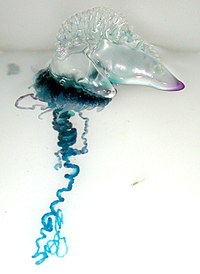
Photo from wikipedia
In vehicular fog computing, task offloading enables mobile vehicles (MVs) to offer ultralow latency services for computation-intensive tasks. Nevertheless, the edge server (ES) may have a high load when a… Click to show full abstract
In vehicular fog computing, task offloading enables mobile vehicles (MVs) to offer ultralow latency services for computation-intensive tasks. Nevertheless, the edge server (ES) may have a high load when a large number of MVs offload their tasks to it, causing many tasks either experience long processing times or being dropped, particularly for latency-sensitive tasks. Moreover, most existing methods are largely limited to training a model from scratch for new environments. This is because they focus more on model structures with fixed input and output sizes, impeding the transfer of trained models across different environments. To solve these problems, we propose a decentralized task offloading method based on transformer and policy decoupling-based multiagent actor–critic (TPDMAAC). We first introduce a transformer-based long sequence forecasting network (TLSFN) for predicting the current and future queuing delay of ESs to solve uncertain load. Second, we redesign the actor-network using transformer-based temporal feature extraction network (TTFEN) and policy decoupling network (PDN). TTFEN can adapt to various input sizes through a transformer that accepts different tokens we build from the raw input. PDN provides a mapping between the transformer-based embedding features and offloading policies utilizing self-attention mechanism to address various output dimensions. Finally, the experiments on two real-world data sets show that TPDMAAC can quickly adapt to a new environment. And compared to existing algorithms, TPDMAAC reduces the system cost by 11.01%–12.03% as well as improves task completion rates by 10.45%–13.56%.
Journal Title: IEEE Internet of Things Journal
Year Published: 2023
Link to full text (if available)
Share on Social Media: Sign Up to like & get
recommendations!